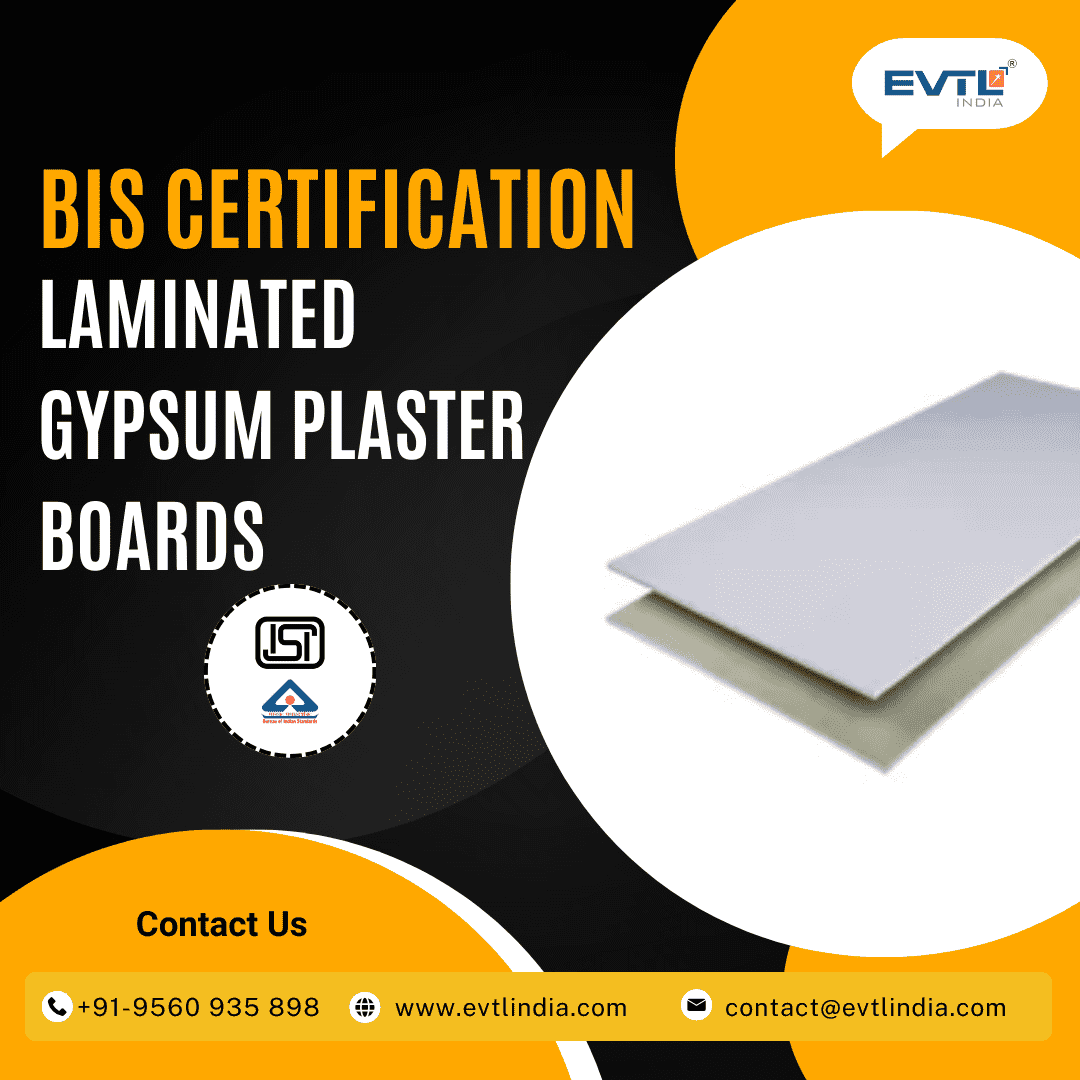
What Makes BIS Certification for Coated/ Laminated Gypsum Plaster Boards Essential?
In India, quality and safety standards for construction materials are becoming increasingly stringent, especially for products such as laminated gypsum plaster boards. To ensure product safety, durability, and market acceptability, manufacturers must obtain the BIS certification for Laminated Gypsum Plaster Boards in accordance with IS 2095 (Part 2): 2022. This standard governs the specifications for laminated boards used in interior construction. Additionally, an ISI mark for laminated gypsum plaster boards is mandatory for selling these products in the Indian market. EVTL INDIA offers comprehensive consultancy services to help businesses seamlessly navigate the process of certification and compliance.
What is BIS Certification for Laminated Gypsum Plaster Boards?
The BIS certification for laminated gypsum plaster boards is an essential quality assurance program implemented by the Bureau of Indian Standards. This certification ensures that the boards conform to the prescribed safety, performance, and quality parameters under IS 2095 (Part 2): 2022. This part of the Indian Standard focuses specifically on laminated boards, which are used widely in commercial and residential interior finishing.
Obtaining the BIS certification for laminated gypsum plaster boards involves stringent testing, factory inspections, and continuous surveillance by BIS officials. The objective is to maintain a high level of product reliability and customer satisfaction.
Importance of ISI Mark for Laminated Gypsum Plaster Boards
The ISI Mark for Laminated Gypsum Plaster Boards is the visible proof that the product complies with Indian quality norms. This mark signifies that the laminated boards have been manufactured under a licensed scheme with strict adherence to IS 2095 (Part 2): 2022 guidelines. Without this mark, it is illegal to manufacture or sell laminated gypsum plaster boards in India.
Manufacturers seeking credibility, acceptance in public and private tenders, and consumer trust must ensure their products carry the ISI mark for laminated gypsum plaster boards. The mark not only protects consumers from substandard materials but also strengthens the brand’s position in a competitive market.
IS 2095 (Part 2): 2022 – Standard Overview
The IS 2095 (Part 2): 2022 is the Indian Standard that sets out the detailed specifications for laminated gypsum plaster boards. This part deals with laminated boards that have enhanced properties for moisture resistance, mechanical strength, and surface finish. The standard includes specific testing parameters for edge strength, core hardness, water absorption, and delamination resistance.
Compliance with IS 2095 (Part 2): 2022 is a prerequisite for obtaining the BIS certification for Laminated Gypsum Plaster Boards and subsequently securing the ISI mark for laminated gypsum plaster boards. The standard is regularly updated to incorporate new technological developments, ensuring only the best products reach the Indian market.
Role of EVTL INDIA in Certification Process
EVTL INDIA specializes in guiding manufacturers through the intricate process of acquiring the BIS certification for laminated gypsum plaster boards. The company ensures end-to-end support, from understanding the criteria laid down in IS 2095 (Part 2): 2022 to acquiring theISI Mark for Laminated Gypsum Plaster Boards. Their consultancy services are designed to minimize delays, reduce costs, and improve the likelihood of approval in the first attempt.
EVTL INDIA helps businesses:
-
Prepare all necessary documents required for application under the BIS scheme.
-
Coordinate product testing at BIS-recognized laboratories.
-
Facilitate the factory inspection process.
-
Ensure consistent compliance with IS 2095 (Part 2): 2022 even after initial certification is granted.
By working with EVTL INDIA, manufacturers can avoid common pitfalls in the certification journey and gain faster access to India’s growing construction market.
Legal and Commercial Benefits
Having the BIS certification for laminated gypsum plaster boards and the accompanying ISI mark for laminated gypsum plaster boards offers numerous benefits. Firstly, it ensures legal compliance under Indian regulatory norms. Secondly, it opens doors to government and institutional projects that only accept certified materials. Moreover, buyers increasingly prefer certified products for their proven performance and durability.
Businesses without the BIS certification for Laminated Gypsum Plaster Boards risk market exclusion and legal consequences. Therefore, aligning your manufacturing process with IS 2095 (Part 2): 2022 is not only essential but also strategic.
Maintaining Compliance After Certification
After obtaining the BIS certification for laminated gypsum plaster boards, manufacturers are required to maintain compliance with IS 2095 (Part 2): 2022 through routine product inspections and testing. BIS may conduct surprise factory visits and audit production records to ensure consistent quality.
Maintaining the validity of the ISI Mark for Laminated Gypsum Plaster Boards is just as important as obtaining it. EVTL INDIA offers post-certification support, ensuring manufacturers stay compliant year-round and handle any regulatory updates efficiently.
Conclusion
EVTL India is one of the leading BIS Consultant in India, helping manufacturers obtain their BIS licences hassle-free. In the construction material sector, compliance with Indian quality standards is crucial for credibility, safety, and market reach. The BIS certification for laminated gypsum plaster boards, governed by IS 2095 (Part 2): 2022, ensures that your product meets these essential criteria. Coupled with the ISI mark for laminated gypsum plaster boards, it gives your brand a competitive edge and builds consumer trust. EVTL INDIA stands as a reliable partner to help businesses obtain and maintain this certification, ensuring a seamless and compliant journey from production to market entry.